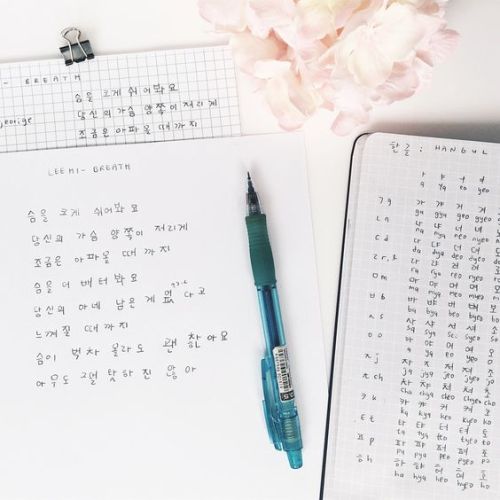
What to Expect When Learning Korean
Westerners often have a difficult time learning Korean or other Asian languages. Eastern languages are very different to English in terms of grammar and pronunciation. This list by lilidoescriticallanguages is a great introduction into what you might expect. Read it here:
—
So you’ve decided to study Korean! That’s awesome! But let me just give you a cautionary warning. Despite what you may have been told by numerous language learning websites that are attempting to sell you their services, Korean is not easy. I have studied Japanese, Chinese, French and Korean for years and I can assure you, Korean is easily the hardest. At least it is in my opinion. Why? Well, I will give you exactly the answer to that and what you should expect while embarking on the journey filled with blood, sweat and tears towards fluency in Korean. (Yes that was indeed a BTS reference).
Speaking Language vs Writing Language
Korean has an incredibly simple writing system, but don’t let that lure you into a false sense of security. While the writing system is notoriously easy, there’s a catch- it is essentially a separate language. In written Korean, certain words and conjugations are used in lieu of the ones used in spoken conversation. The conjugations may not be that difficult to remember, but remembering which words are only used for writing and which are only speaking can get tricky.
Tip: Regardless of which one you learn first, you need to treat these as essentially two languages. I recommend starting with speaking first but it’s up to you.
How To Express Yourself: Re-Learning How to Think
I want you to do something for me. I want you to close your eyes, clear your mind and pretend that you are an infant with no knowledge of language at all. Difficult isn’t it? Well, yah it is because you’re an adult and your brain has already developed using a certain language already and it’s harder to get another language in there, but that’s exactly what you’ll need to do if you want to learn Korean. Gone are the days where you can stick an English expression into a translate and get a coherent translation in your target language. In Korean, things are expressed in an entirely different way than you would expect and you must realize that they are all culturally based. Even saying ‘goodbye’ will require you to think about who you’re talking to and, interestingly enough, if you’re saying goodbye to someone leaving or if you yourself are leaving and they’re staying.
Tip: Try not to memorize things in terms of their English translation. Do your best to remove your dependence on English because it will only cripple you. In fact, the English translation of many grammatical points and vocab will not entirely encapsulate the meaning of that vocab word or grammar point. The true meaning you will have to learn through a fully immersive baptism. In that light, you will be learning most of Korean experientially instead of through rote memorization.
Learning how To Be Polite
Politeness levels are very trial by error as well unfortunately. The levels themselves are categorized for you, but their actual usage varies and will have to be figured out as you go. Keep in mind that there are only three most important politeness levels that you need to know:
합쇼체 or formal ( example: thank you/감사합니다),
해요체 or polite (example: thank you/고마워요),
and 해체 or informal (example: thanks/고마워).
Tip: After you master the conjugations correlated with each politeness level, you will need to learn code switching, or switching between politeness levels of speech quickly in a normal conversation. Say you come from having a conversation with your boss then your colleague asks what happened. You’ll have to switch from a higher level of politeness to a slightly lower one (assuming you and your colleague are about the same age).
Spelling
I have always hated spelling in grade school because English often doesn’t follow a logical structure when it comes to spelling words. It’s just totally arbitrary sometimes! When it comes to Korean, however, one would think that it would be easier to sound stuff out in Korean since they have easier phonetic sounds, right? Well, one would be wrong! I struggled spelling even basic words in Korean at first and I couldn’t simply sound it out. Spelling is often difficult to nail down because there are certain characters that sound the same ( like ㅐ/ae and and ㅔ/e) and there are particular spellings for words that you’ll just have to memorize. There’s really no way around it but to buckle down and get to memorizing.
Learning Grammar Based on Context
Just like how you need to change the way you think, you need to get into the habit of attributing certain grammar points to specific contexts. Grammar in Korean is very context specific. So don’t assume that because you learned one way to say the word ‘and’ that that is the only way to say the word ‘and’. In fact there are a few ways to say the word ‘and’ that are context specific so be careful.
Tip: When you learn a grammar point make sure to pay attention to the context of how to use it and make a note of that. You will probably learn another way to express that idea anyway, so make sure to keep all your notebook super organized and understand how to use that grammar point fully before moving on to the next.
Hope this helps guys! Lemme know if you need any further help or advice!
—
Post credit: lilidoescriticallanguages




